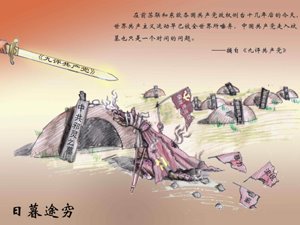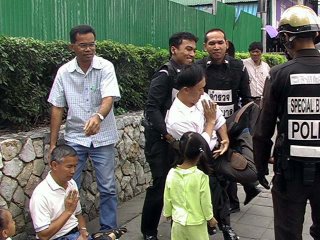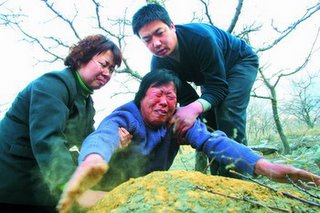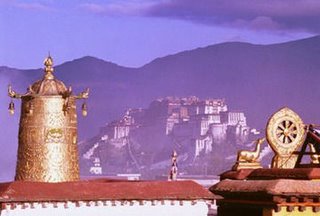
Future of Communism in China
UofT Conference
Stockwell Day, MP
Epoch Times: 25 May 2005 - In my office, we have learned to look forward to the weekly copy of The Epoch Times. It is a helpful source of information and commentary on areas that are of interest to me, but which, sad to say, often get overlooked or minimized in news sources across Canada.
The editors of the Epoch Times are concerned for the progress of democracy everywhere in the world, and alert to human suffering everywhere. Recent issues have spotlighted oppressive behaviour of the regimes of Burma (Myanmar), Nepal, Sudan, Vietnam, Zimbabwe and many others. This coverage has proved valuable to me as I have urged the government of Canada to take a more forward part in the advancing of human rights throughout the world.
In our major newspapers, the section on international affairs is shrinking and is retreating further and further back into the pages. Editorials often express authentic humane concern for the suffering of the particular people who have the attention of the major news wires (that would be Darfur, this week) but in the main news section of the same papers we find little evidence that the newspaper is interested in hearing more bad news than it can comfortably contain within the limits of our major domestic pre-occupation with issues of health and prosperity. Rarely do they demonstrate the investigative spirit which marks the Epoch Times.
Too many people do not seem to appreciate that our indifference to the circumstances under which most of the world live their daily lives is serving the propaganda purposes of the unappeasable enemies of our way of life.
I recommend regular reading of The Epoch Times as an antidote for self-preoccupation.
*** The Nine Commentaries on the Communist Party
Our theme today is current disillusionment with Communism in the People’s Republic of China. While this is the question closest to the heart of the editors of The Epoch Times and to most of its readers, it is not a parochial or an ethnic preoccupation. The Epoch Times sees the China issue in the context of the global struggle for democracy and human rights.
Most of you know the background of this story
The Epoch Times published, first in the Chinese language (in November, 2004) and thereafter in many translated versions, a document called NINE COMMENTARIES ON THE COMMUNIST PARTY which subsequently became available on the internet. This document reviewed the history of the Communist Party of China, exposing the distortions which the Communist Government of the People’s Republic of China still propagates and defends – distortions which (sadly) have been parroted by students of China’s recent history in our own learned communities, in editorial commentary and in policy-making circles. The effect of this publication of the Nine Commentaries has been electric. By May 10, 2005 , 1.3 million persons had publicly registered their resignations from the Chinese Communist Party. Every day, another 10,000 resignations are posted on this internet site. Banners and posters have begun to appear throughout China with news of these resignations, and discussions are taking place everywhere. A high price has been paid by many of the signatories – in whose ranks are many teachers, public officials professional people of many sorts.
These shocking events have caused the Central Chinese Communist Party School to rush cadres to each of the 58 Provinces of China to organize study groups and to secure re-commitments to the CCP. It appears that this campaign in reaction to the Nine Commentaries may have boomeranged, as it has brought greater publicity to their existence and given greater currency to the words of the commentaries.
Not the least astonishing feature of this story – and certainly the most disappointing to me -- is the almost total neglect of it by our media.
Do our journalists and editors and publishers not regard this as a significant story? What on earth could be more significant? Or do they suspect the truth of it? Perhaps they have been inoculated by propaganda which the PRC generously provides regarding the economic miracle and the steady strides towards prosperity of the Chinese people? It is worth recalling, in this context, the nearly-total failure of our journalists, and for that matter our academics and professional commentators, to accept the auguries of imminent collapse of the Communist Empire of Europe as late as 1989– their underestimation of the demand for democracy, the role of the dissidents and the refusniks; even as Soviet Communism was cracking up, our own commentators were denying the vitality of powerful regional forces, based on traditional memories of ethnic solidarity and dismissing the force of religious allegiance after sixty years and more of officially declared atheism.
In general, journalists need a longer historical perspective. With reference to our interest here: they need to consult the history of the longing for democracy in China and the vital record of democratic accomplishments of the past.
*** Chinese people and the challenge of democracy
This renunciation of CCP membership does not come out of nowhere.
We have heard for decades much learned talk about the absence of democracy from the history of the Chinese people. Some have been so bold as to talk about a hereditary instinct against democracy in the Chinese gene pool. How else, they say, do we explain the fact that the vast majority of Chinese in the world today - those who live under the rule of People's Republic of China - have been ruled for so long by anti-democratic, one-party, authoritarian rule?
Does this fact speak to an incapacity for democracy?
Well, the short answer to that question is the recent History of Taiwan.
But I want to direct our thoughts in the direction of the longer answer – which we find in the history of the Chinese people’s pursuit of democratic practice over the last century.
This history, as I read it, is characterized by courageous efforts to incorporate democratic and liberal practice. Only a century ago, Chinese people were apparently locked for eternity into a legacy of oppression by hereditary emperors, abetted by a totally submissive intelligentsia, fortified by an official ideology which nourished elitism – and all propped up by cohorts of illiterate peasant-soldiers. At the beginning of the twentieth century, intellectuals (both those in China and those abroad) who wished to be taken seriously insisted that Chinese people had lived so long under that despotism, that the will to be free simply could not take hold. But then out of nowhere (so it seemed) there appeared certain bright spirits – the most notable being Sun Yat-sen -- who defied this autocracy in the name of democracy.
The collapse of the autocracy in 1911 was so sudden and so dramatic, that the historians are still struggling to explain the dynamics of it. It has been a story of two steps forward, one backward – again and again. There has been much disappointment (to put it mildly), but when you reflect that a century is not a long time as historians reckon time, and that China, at the opening of the twentieth century had still not yet begun the transition from feudalism, the truly remarkable aspect of this story is how much was accomplished.
Sun Yat-sen (1866-1925), known as the Father of the Chinese Revolution, sought to combine the people’s memories of recurring resistance to oppression with a carefully-defined and, as he saw it, scientific theory about self-government which drew on Western models. An educated man (a medical doctor) widely traveled, a Christian with many admirers among leaders and laity of the Church throughout the world, he developed three Principles of the People (1905) in which he combined nationalism and democracy with some features of current socialism. When revolution broke out against the last of the Emperors, (the boy-king whom we in the West call Henry Pu-yi), Sun’s ideology quickly permeated through the ranks of all classes who expected a sudden reversal of all of the effects of centuries of autocratic government. But things quickly went wrong: most of the powerful figures who had benefited from the old arrangements re-asserted their interests by brutal force, and within a very few years many were saying that things were worse than before.
Sun's brief but inspiring regime still commands our respect and deserves renewed study. To this day, Chinese everywhere, on the mainland, and on Taiwan and throughout the Chinese-Diaspora, look to Sun Yat-sen who inspired the hope for democracy. The essential virtues of his teaching must not be forgotten - it is true that his successors in the Kuomintang slipped much too early into the temptation of compromising democratic principles and the worthy ideal of transparent governance, bringing discredit upon these principles. What is worse is that the Communist Party of China fouled the reputation of Sun's democratic principles by making them go under the yoke of Marxist-Leninist theory.
As Sun worked to make autocratic China over into a democratic and liberal nation, he encountered vast obstacles. Some may be defined as "natural" obstacles: among the most conspicuous of these is the enormous population and geographic extent of China as well as the complex ethnic and regional differences. Also, there was in those days (the 1910s and 1920s) the awesome legacy of centuries-old suppression of the individual spirit: the legacy of feudalism, illiteracy, the brutal rule of warlords and the absence of what we would regard as the rule of law. But what really mattered – as we can see today – is that the promise of democracy really did enter into the soul of the Chinese people: the connection between democracy and freedom was clearly perceived and almost universally accepted.
After a few years, the autocratic interests had re-established themselves, under new names: there were warlord regimes in various provinces and many political parties all pretending democratic principles but all incapable of providing vision for the whole nation. The disappointments which befell Sun Yat-sen caused him to revise his expectations for China . He abandoned his plan for immediate realization of democracy in order to promote “guided democracy” – a one-party system, with the top level of government controlled by the party and not subject to democratic review. Sun was led in this direction by advisors from the Soviet Union , then new in the world, and promoted by many in the West as a vanguard of people’s democracy. Sun’s Kuomintang party now entered into partnership with the Chinese Communist Party, guided by the Soviet Union . This was a grave error.
Predictably, the alliance broke down by the mid-1920s. Sun’s successor, Chiang Kai-shek soon discovered that the ideals of the communists were incompatible with Sun’s legacy; and so he pursued a model of “guided democracy” – guided, that is, by him. Eventually, he promised, his guiding hand would be graciously lifted, and real democracy would be installed. That moment never came in his lifetime, nor in the lifetime of this son and successor. It has, however, been realized in our own time, following several revisions of Chiang Kai-shek’ s constitution, and authentic democracy has developed on the island of Taiwan.
As you all know, there began in the late 1920s a violent civil war between populations aligned with the Kuomintang and populations aligned with the communists under Mao Dze-dong – a civil war which was still going on when Japan attacked China and which was only partially recessed during that Japanese war (which ended in August, 1945.)
It is no concidence that when the regime of Mao Dze-dong took hold in 1949, its first item of business was twofold - the extirpation of free speech (without which democracy cannot exist) and the extirpation of the Churches. When Mao set out upon his campaign to destroy Christianity in China , he covered his totalitarian intent with slogans about foreign influences, American corruption, and so on. This line suited his internal propaganda purposes, and it also struck a responsive chord among elites in the West who tend to despise the presence of religion in their own midst, and are glad to be persuaded that Christianity is just one face of Eurocentrtic imperialism. Decades later, when the PRC felt compelled by what had befallen Communist regimes elsewhere to moderate its policy of persecution of the churches and began, simultaneously, to admit a place for free enterprise and private ownership in Chinese life, we in the West were permitted a belated look into the life of the Chinese of mainland China. What became immediately evident was that the desire for democracy had never been destroyed, nor had the desire for freedom of expression and, above all, the desire for freedom of religious expression.
Because of the tight control of all aspects of information, and because the attention of western media had turned to other matters, we in this part of the world were not permitted to see more than a few random and apparently eccentric cases of democratic protest during the entire Maoist period. By the time that the Tiananmen demonstrations broke out in June of 1989, advances in communications technology had made it virtually impossible for even that iron-fisted regime to close off its daily life from view of the outside world. Live interviews with many of Tiananmen protestors certified worldwide the irrepressible desire of the Chinese people for democracy and provided encouragement on every continent for common people dedicated to the same end.
*** What we should do?
The Canadian government should be giving publicity to these events -- the posting of the Nine Commentaries and the subsequent resignations from the CCP. I have found almost nothing in Canadian papers on the Nine commentaries or on the subsequent resignations from the CCP. It is not a difficult story to understand. Canadians will recognize the meaning of this immediately, provided it appears on front pages.
The government cannot tell the free media to give publicity to anything – but our media would have to satisfy the public’s interest to know more if government would take the initiative in publicizing this dramatic exercise in free speech.
Publicity is the key to this. As many of you will know, there was a brazen effort of the Government of the PRC to keep reporters representing non-Communist voices out of the entourage of the Prime Minister in recent visit to China . Our government pretended that the PRC was merely exercising its right as host. This is a sheepish and unworthy line.
The Canadian government should be bringing publicity to the denial of human rights in China .
China is the number one offender against Human Rights. Yet China has never been the subject of a Resolution of criticism of her human rights record in the UN – not from the Human Rights Commission, not from any other of the commissions.
Now here is an incredible irony: China is still receiving $50 million annually from Canada in the form of development aid– amounting to a half a billion dollars over the last decade!
Governments of smaller and more vulnerable nations as well as governments which are, like China , determined to maintain their citadels against forces seeking to advance human rights go along comfortably with this conspiracy. There is no excuse for Canada ’s practice of averting its eyes from the human condition in China. The sad fact is that we are so keen on enlarging our share of what we imagine a vast and bottomless economic opportunities in China that we merely make ritual statements at opening of meetings – and then hold our tongues while we get down to real business.
I notice an item in The Epoch Times, March 25-321, 2005, entitled “Pettigrew Criticized for Silence on China at UN.” Speaking for a number of NGOs (Non-Governmental Organizations), Amnesty International’s Secretary General, Alex Neve, said: “The ongoing failure of the Commission on Human Rights to tackle the serious human rights violations in China is shameful. . . . Canada ’s unwillingness to support, let alone to spearhead, an attempt to bring a resolution before the Commission is a disappointment, which is compounded by the absence of any reference to China ’s dismal human rights record in Minister Pettigrew’s speech to the Commission on its opening day.”
Incidentally: while so many of our businessmen are wringing their hands at the thought that we could alienate the government of China by raising the matter of human rights and other matters that should concern us (the use of slave labor, for instance) -- that being “provocative” in this way would, somehow cause the PRC to take up its marbles and go home – the best informed economists are sketching an opposite scenario: namely, that we have offered far too many hostages to the rhetoric of the ever-booming economy. Chinese official statistics (there are no other kind) should not be trusted, anymore than the facts and figures offered by such earlier command economies (the Soviet Union, for example) ought to have been trusted. If, as the advocates of trade with China suggest, we cannot risk raising human rights issues for fear of seeing our share of this Cinderella economy diminish, then, maybe, as I see it, we are doing the business community a kindness by reminding them that in the long haul our efforts to provoke China in the direction of democracy and limited government and free enterprise and respect for human liberties will contribute to the soundness of the Chinese economy.
* * *
I am a firm believer in freedom of trade. I also believe in freedom of speech, freedom of religion, freedom to own property and the freedom to be enterprising.
When we stand up and speak up for human rights and individual freedoms we advance the hopes for a prosperous future of all people.
When we remain silent in the face of tyranny and repression we prolong poverty and human misery.
The courageous former leader of the Czech Republic , Vaclav Havel, said: “It is suicidal to draw on . . . the idea that evil must be appeased and that the best way to achieve peace is through indifference to the freedom of others. Just the opposite is true.”
Ladies and gentlemen, you have my pledge that I will never be indifferent to the freedom of others, whether in China, or anywhere.
I will work with you in advancing the great cause of freedom and democracy everywhere.







